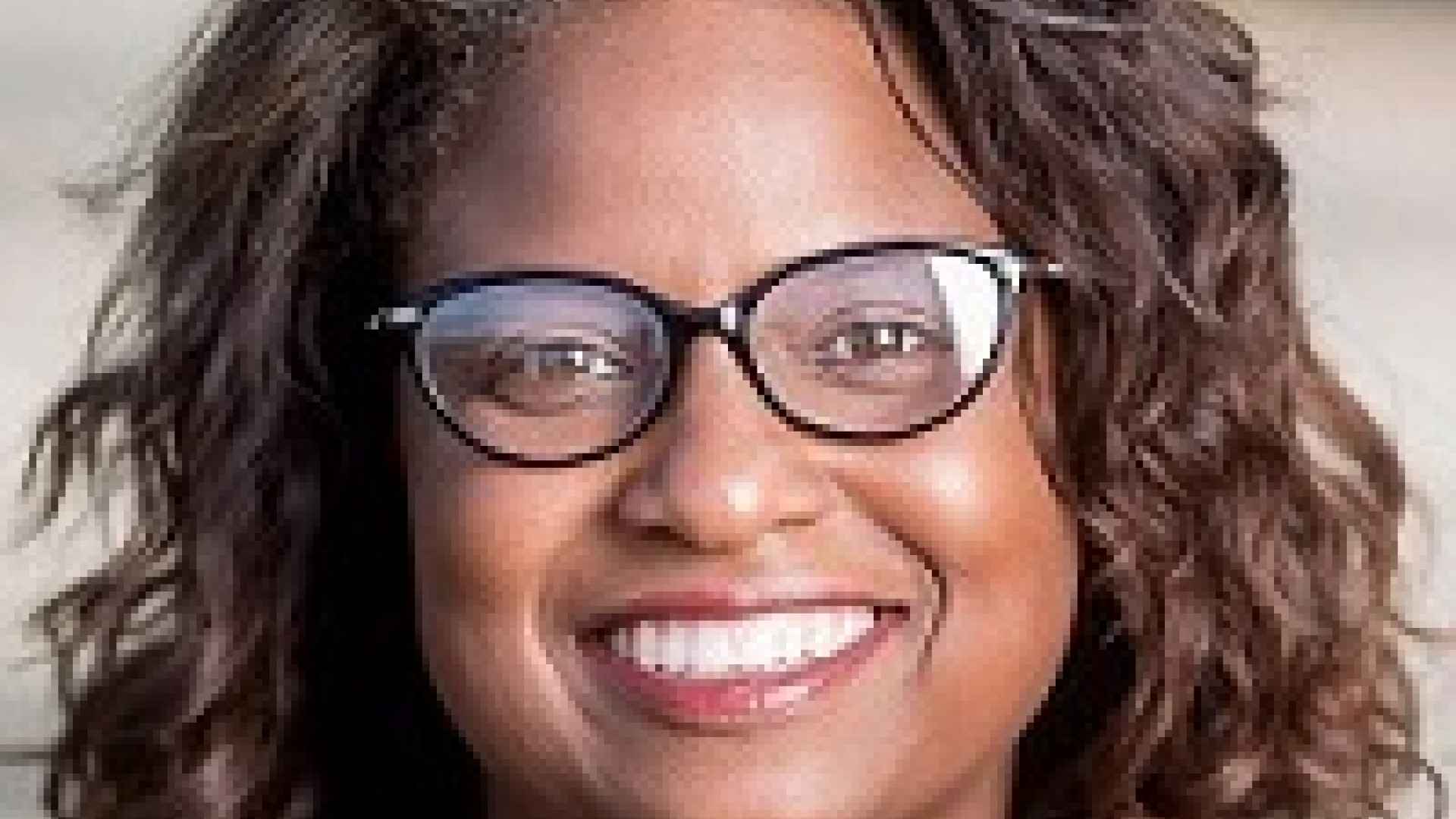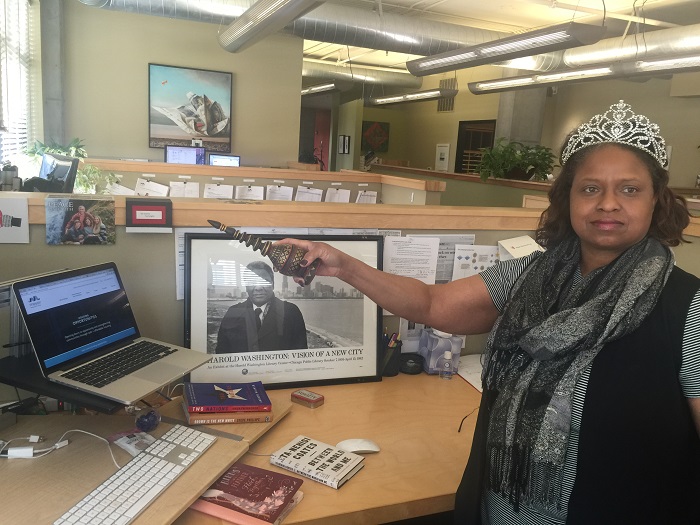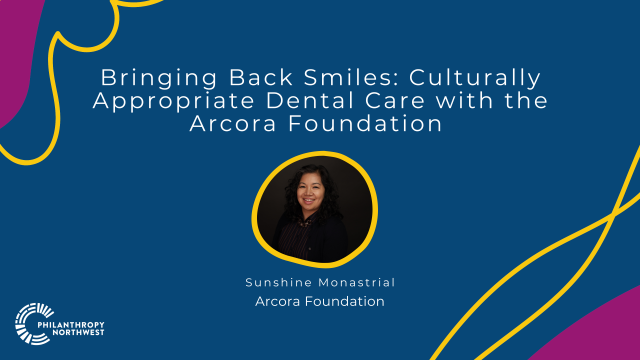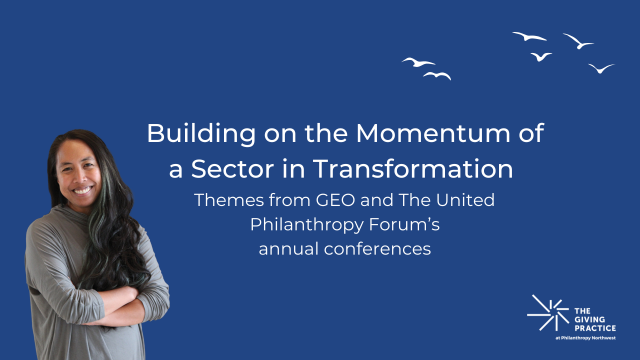
Sharon Wade Ellis, Momentum Fellow
When I was a kid, I spent summers with my grandparents in their old and drafty home on Chicago's South Side. I recall going to the candy store next door, falling asleep on the enclosed back porch with the hot Midwestern summer sapping all my energy, listening to the roar of the trains rattling by. I remember navigating the rickety wooden stairs down the dirt alley to a shared garden patch where we'd pick greens and onions, and crossing the gravel parking lot to visit my great-grandmother nearby.
My grandmother would often share her own memories of that home and say, “Those were good times," and I remember thinking, "It's just an old, dilapidated house.” With each passing year, however, I grew to understand my grandmother’s feeling. There was always laughter, especially around the kitchen table. Even when hard times hit, there was a sense of security permeating every nook and cranny of that old home — and laughter wasn’t far behind.
 I eventually knew what made those good times. Old as it was, that home offered refuge, and that garden provided more than nourishment: together, house and garden tied the family closely to their community. They cherished its security and affordability. In the minds of my grandparents, the home and everything associated with it was theirs — but they didn't own it, and therefore knew they could lose it one day. They were lucky: they lived in that home until they decided to move. That place — their place — left me with a certainty: everyone has a right to a stable and affordable home.
I eventually knew what made those good times. Old as it was, that home offered refuge, and that garden provided more than nourishment: together, house and garden tied the family closely to their community. They cherished its security and affordability. In the minds of my grandparents, the home and everything associated with it was theirs — but they didn't own it, and therefore knew they could lose it one day. They were lucky: they lived in that home until they decided to move. That place — their place — left me with a certainty: everyone has a right to a stable and affordable home.
Dreams of Home
Sam and Gwen, my parents, did everything to take care of me and my brothers Wade and Kwame. They broke the cycle of poverty in both their families by earning doctoral degrees. But even so, my parents had to overcome many of the same barriers that my grandparents had faced. Being black in America was just as difficult in the 1960s as it had been in 1920s. Nonetheless, my parents and many other black Americans succeeded — despite the Homestead Act of 1862; despite the broken promise of “40 acres and a mule;" without the transfer of wealth from previous generations; without the full G.I. Bill benefits that white American veterans relied on. They pressed forward, in spite of the redlining practice that was alive and well wherever we went: Chicago, Detroit, San Francisco and Houston.
My parents were dreamers, a gift they also bestowed on me. They passed on their courage and resilient spirit to their children, and encouraged me to pursue a career doing something I loved. Somehow, I always knew I would work in a profession closely related my first love of architecture. More than physical buildings, however, I was drawn to what they represent.
Six months ago, a group of foundation CEOs, including Meyer Memorial Trust's Doug Stamm and Marguerite Casey Foundation's Luz Vega-Marquis, came together with Philanthropy Northwest to create the Momentum Fellowship, a leadership development opportunity for individuals from underrepresented and diverse backgrounds. Every day, I’m reminded how blessed I am for the opportunity to be a part of the inaugural cohort — and believe it’s not by accident that I'm now working on Meyer Memorial Trust's Housing Opportunities Portfolio. Providence, serendipity and my parents’ faith helped bring me where I am today.
On the ground, most nonprofit organizations working on affordable housing have to be very targeted — maybe only working with one group of people, or on rural housing issues, or on innovations in housing or cost-efficient development. They can’t do it all. But from the "balcony" level, philanthropy allows you to have a broader perspective. I’m learning how preservation of federally-funded housing is imperative in protecting the large amounts of affordable homes that exist in rural communities; that manufactured homes can be a viable source of affordable housing; and that private market landlords can be engaged to help leverage private market units as affordable housing solutions. With this wider scope, I'm cultivating a comprehensive understanding of the equitable housing landscape.
Why Equity in Housing Matters
Meyer Memorial Trust recently announced our new funding opportunities, and I've wanted to jump for joy these past weeks as I anticipated the first information session. The resounding message, around a key theme prevalent of each portfolio, is a focus on intended outcomes linked to equity.
I’ve always been moved by a quote from The Case For Reparations, Ta-Nehisi Coates’ groundbreaking 2014 article in The Atlantic: “Two hundred fifty years of slavery. Ninety years of Jim Crow. Sixty years of separate but equal. Thirty-five years of racist housing policy. Until we reckon with our compounding moral debts, America will never be whole.”
Working at Meyer has provoked me to rethink my position on how I see equity playing out in the black community. In the past, I was dogmatic in my belief that the only route to wealth creation for the black community was through homeownership. I now trust that in addition to homeownership, there are other equitable approaches that can support asset building and wealth creation. Policies that support opportunities for self-actualization and classes on financial literacy are other approaches that can act in tandem with homeownership. I am also more open to efforts that address stabilizing families and seek to reverse displacement, like Right To Return policies. These policies begin to move society towards recognizing the wrongs that have been done to all communities of color.
To address the “moral debts” America has exacted upon the black community and people of color in the past (specifically around redlining, urban renewal and displacement), nonprofits and philanthropy must find a common chord and a clear strategy for creating equitable housing for the communities they seek to serve. In essence, the approach requires that communities be purposeful in their request to funders by identifying and linking equitable outcomes to measurable intended outcomes — and that funders respond by understanding their needs through direct interaction with community stakeholders and by supporting the common chord strategy.

I am right where I should be. I carry my passion forward to the work I do at Meyer, finding relief for my nagging ache of wanting to help people access housing that meets their needs. From the other Momentum Fellows and from my colleagues, especially on the Housing Opportunity team, I learn something new every day and I move closer to discovery of what may ultimately help solve the housing dilemma once and for all. The intersection of my work, the role of philanthropy, and the role that communities play can help Oregon equitably meet every Oregonian’s housing need.
And I still love falling asleep to the sound of trains.
Sharon Wade Ellis is a Momentum Fellow hosted by Meyer Memorial Trust. Read more about the Momentum Fellowship on our website, and stay tuned for more blog posts from our first cohort.



Comments
That's a beautiful story. It
That's a beautiful story. It's inspiring.
Wow! Sharon! How inspiring
Wow! Sharon! How inspiring you are and my heart sings that you have found your way to this! What a great match--your special talents and this opportunity will bring blessings and learning for so many of us!!
You definitely found your
You definitely found your calling, Sharon! What an inspiration you are!
Very inspiring!
Very inspiring!
My soul is inspired!
My soul is inspired!
Thank for sharing your family
Thank for sharing your family's story Sharon. Beautifully written. We all desire a secure and affordable home. Unfortunately that's out of reach for far too many. Your work through philanthropy makes a difference.
Thank you for reading my blog
Thank you for reading my blog and for the comment:). You're doing great work! It's my hope that as inspiring as my words are, othera will join us and seek solutions collectively to make affordability in housing a reality for everyone.
What a great read. So many
What a great read. So many good insights. I am so pleased that you are here and I'm delighted that we benefit from your wisdom, insights, knowledge, experiences and joyfulness.
While I work with Sharon
While I work with Sharon every day at Meyer Trust, but I learned so many new aspects and perspectives of my colleague in this blog. Thanks for the sharing of your experience and gifts with all of us at Meyer, Sharon, and with the wider communities of philanthropy and housing.
Woah! My heart is shaken and
Woah! My heart is shaken and my belief is strengthened. It's been an honor and privilege working side by side with you on this journey. And thank you Meyer Memorial Trust for providing a "home" to help alleviate some of that "nagging ache." Thank you Sharon for your laughter, love, and life nourishing moments. Much, much, much love!!!! ~Marcelo